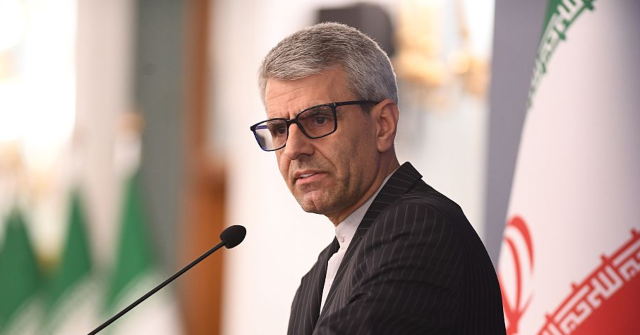The Islamist regime governing Iran declared on Monday that it would make “no slightest compromise” on enriching uranium in talks with the United States, dismissing a core demand from Washington after five rounds of nuclear talks.
President Donald Trump announced in April that America and Iran would engage in “direct talks” intended to establish a framework to curb Iran’s illicit nuclear weapons development and replace the functionally extinct “Joint Comprehensive Plan of Action” (JCPOA), the nuclear agreement signed under former President Barack Obama. Iran has failed to agree with the American team on every single aspect of these negotiations — including insisting that the talks are not “direct” because mediator state Oman is reportedly passing notes back and forth between the delegations — but has nonetheless participated in five rounds of such talks since April.
The latest round of talks occurred in Rome, Italy, on Friday, again facilitated by Omani government officials. The first four rounds occurred in Muscat, Oman.
Iranian Foreign Ministry spokesman Esmaeil Baghaei, addressing the conversations in Rome, told reporters on Monday that Iran is not seeking an interim agreement with the Trump administration to bridge the gap created by the informal dismissal of the JCPOA and emphasized that the top demand of the U.S. side, for Iran to stop high-volume enrichment of uranium, was not in any way on the table.
“What is clear and probably needs no emphasis is that uranium enrichment, as an inseparable part of Iran’s peaceful nuclear energy, must definitely be maintained, and we will make no slightest compromise in this regard,” Baghaei insisted, according to Iran’s state-run PressTV outlet.
The Foreign Ministry spokesman suggested that Iran could help other Middle Eastern states seek their own enrichment, but not as a substitute for Iran enriching uranium at home.
“Iran will support any process to involve regional states in enrichment and the production of the fuel needed for peaceful nuclear projects, but this initiative can in no way replace the uranium enrichment program inside Iran,” he indicated.
Iranian officials claim that the country is seeking only to create a peaceful nuclear energy program to supply clean electricity to its populace. American officials have repeatedly countered that such a peaceful nuclear program, which exists in a much higher number of countries than those armed with nuclear weapons, does not require high-level uranium enrichment. Iran has repeatedly ignored these concerns, equating enrichment useful only to develop a nuclear weapon with practices necessary to run nuclear power plants.
Baghaei’s comment on Monday appear to be movement away from the position Iran held as recently as two weeks ago, when Deputy Foreign Minister Majid Takht-Ravanchi told reporters that Tehran was willing to accept temporarily limits on uranium enrichment.
“For a limited period of time, we can accept a series of restrictions on the level and volume of enrichment,” Takht-Ravanchi was quoted as saying. Similar restrictions were included in the terms of the failed JCPOA.
A week later, Iranian Foreign Minister Abbas Araghchi appeared to walk back that suggestion, writing on social media: “Figuring out the path to a deal is not rocket science: Zero nuclear weapons = we DO have a deal. Zero enrichment = we do NOT have a deal.”
Multiple high-ranking members of the Trump administration have stated plainly that containing Iranian uranium enrichment is critical to any nuclear agreement.
“They have to walk away from sponsoring terrorists, they have to walk away from helping the Houthis, they have to walk away from building long-range missiles that have no purpose to exist other than having nuclear weapons, and they have to walk away from enrichment,” Secretary of State Marco Rubio listed in an interview in early May.
“These are not unreasonable requests,” he added.
Trump’s Special Envoy for the Middle East Steve Witkoff, who is leading the talks with Araghchi, told Breitbart News this month that ending uranium enrichment was a “red line” for the White House.
“An enrichment program can never exist in the state of Iran ever again. That’s our red line,” Witkoff explained. “No enrichment. That means dismantlement, it means no weaponization, and it means that Natanz, Fordow, and Isfahan — those are their three enrichment facilities — have to be dismantled.”
PressTV condemned Witkoff’s comments at the time as “deeply inflammatory and undiplomatic,” without identifying Breitbart News as the source of his statements.
Iranian President Masoud Pezeshkian, who is subordinate to “supreme leader” Ayatollah Ali Khamenei, departed on Monday for a two-day visit to Oman. While Iranian media have emphasized that the visit is meant to improve bilateral ties, particularly regarding trade, and not to discuss the talks with America, Araghchi is part of Pezeshkian’s delegation and Pezeshkian commented on the talks before his departure.
The Iranian president was dismissive of conversations with the United States.
“It’s not like we will die of hunger if they refuse to negotiate with us or impose sanctions,” Pezeshkian said. “We will find a way to survive.”
Follow Frances Martel on Facebook and Twitter.
Read the full article here


